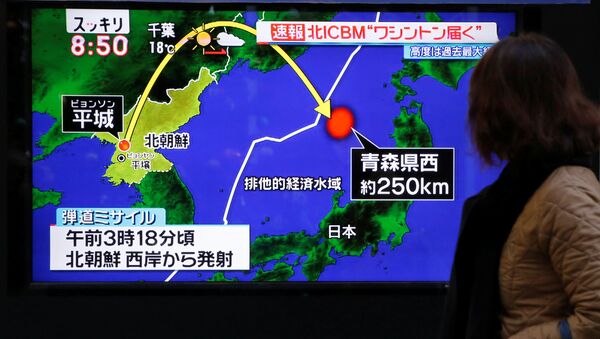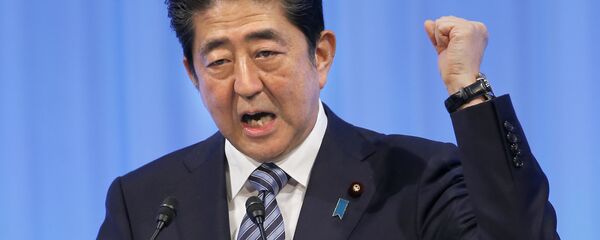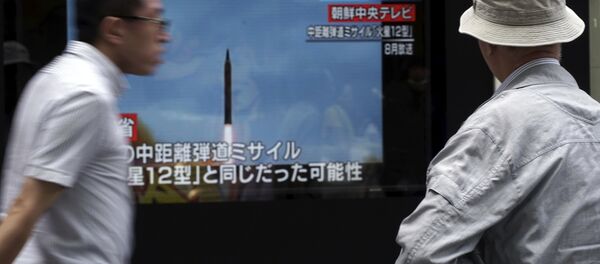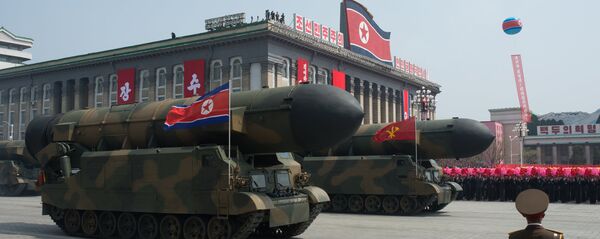MOSCOW (Sputnik), Tommy Yang — When North Korea successfully tested its latest intercontinental ballistic missile (ICBM), known as the Hwasong-15, last week, the missile traveled for 53 minutes and covered a distance of 950 kilometers (590 miles), reaching a maximum altitude of 4,475 kilometers (2,780 miles) before landing in a target area in the Sea of Japan. Security experts said North Korea’s new ICBM could have a range of more than 13,000 kilometers (8,100 miles), capable of reaching any part of the US mainland.
During previous missile tests conducted by North Korea this year, a number of missiles fell into the Sea of Japan with some even flying over Japanese airspace. Faced with growing threats from North Korea’s nuclear arms program, hawkish security experts in Japan have started to advocate the nation to improve its missile defensive capabilities, with some going as far as to suggest that the country acquire nuclear weapons through the deployment of US tactical weapons or developing its independent nuclear weapons program.
However, other Japanese scholars argued that it was not necessary for the nation to acquire nuclear capabilities, because the country was not the main target for North Korea’s missiles.
"This [nuclear crisis] is not about defense of Japan fundamentally. It is about the defense of South Korea. If North Korea attacks, they [South Korea] are the target, as the two Koreas have been competing for a long time. The target for North Korea is fundamentally South Korea. We’re not super concerned, because, ultimately, this is about the defense of South Korea. That’s why it’s not really necessary for us to think about acquiring nuclear weapons because of [threats from] North Korea," Narushige Michishita, a security policy studies professor at the National Graduate Institute for Policy Studies in Tokyo, told Sputnik.
The Tokyo-based expert explained that South Korea’s close proximity to North Korea also forces it to set a different priority from Japan.
"Japan is far away from North Korea. Defense oriented approach makes sense for us. South Korea is very close to North Korea. They tend to put emphasis on offense [capabilities]," Michishita said.
The Japanese expert further noted the strategic alliance between Japan, South Korea and the United States.
"If North Korea attacks South Korea, Japan and the United States would help South Korea defend itself. What North Korea is trying to do is to prevent Japan and the United States from providing support for South Korea," he said.
READ MORE: Russian FM Reveals First Victims in Case of War on Korean Peninsula
No US Nukes in Japan
"We don’t have to deploy them [tactical nuclear weapons] in Japan. There will be a huge outcry, because Japanese people have a strong anti-nuclear sentiment. This could even undermine the health of US-Japan Alliance, rather than strengthening it. That would be a stupid idea," he said.
The Japanese scholar believed the presence of tactical nuclear weapons would offer more psychological value than actual military strength.
"Military value of tactical nuclear weapons stationed in South Korea would not be that high. They [tactical nuclear weapons] simply have more symbolic and psychological effect to reassure South Koreans that we might be able to use them as a bargaining chip in future dialogues. They could also undermine the coercive value of North Korea’s nuclear capabilities. The reintroduction of US tactical nuclear weapons in South Korea is more of political than military nature," he said.
The significant improvement of conventional weapon systems in recent years make them almost as efficient as nuclear weapons, experts suggested.
"In comparison with 20 years ago, conventional capabilities today, such as Tomahawk [missiles], joint direct attach munition and precision-guided munition, can do a lot of things. They’re as effective as nuclear weapons," Noboru Yamaguchi, a professor of international relations at the International University of Japan in Niigata and retired lieutenant general in Japan’s army, known as the Ground Self-Defense Force, told Sputnik.
READ MORE: North Korea May Face Maritima Sanctions Over Latest Missile Launch
Improve Japan's Defense System
To defend itself against increasing threats of North Korea’s missiles, Japan has continued to improve its missile defense systems by procuring advanced US weaponry.
"The two Aegis systems in the Sea of Japan can already cover the whole territory of the country. In comparison, Patriot has a very small footprint. But any kind of missile defense system is not perfect. There may be some leakage. It’s still much better than having nothing. Japan has come a long way in the right direction," he said.
The Niigata-based expert pointed out that cost could be an obstacle for Japan to acquire additional offensive capabilities, such as long-range cruise missiles.
"There’re some people argue that we need to have some kind of offensive capabilities. I understand their argument and that could be an option. But the offensive capabilities are not free. They’re very expensive. It’s a matter of priority. If we have offensive capabilities like long-range missiles such as Tomahawks, we still need to know where the targets are before launching a strike. That requires intensive command and control capabilities, as well as intelligence and reconnaissance capabilities. Any kind of improvement takes a lot of money," Yamaguchi said.
READ MORE: North Korea Launches Ballistic Missile — Reports
Japan has been preparing to acquire precision air-launched missiles that would give it the capability to strike North Korean missile sites for the first time, according to media reports this week. During his first visit to Japan in early November, US President Donald Trump encouraged Japanese Prime Minister Shinzo Abe to "purchase a lot of military equipment" from the United States.





